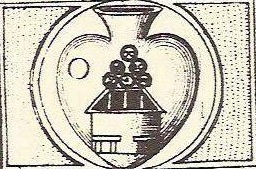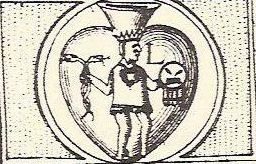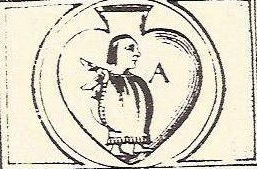ANTH 150: Linguistics and Anthropology
This course provides the student with a practical introduction to structuralist methods of linguistic analysis. There is a focus on both theoretical discussions about, and practical exercises in, the phonology, morphology, syntax, and semantics of natural human languages. Additional topics include: the acquisition of linguistic and communicative competence; the relationship between human language and other animal communication systems; and cultural and social dimensions of language variation (including the study of regional and social dialects, code switching and mixing, speaking styles, registers, and idiolects). The course is intended both as the College's general introduction to formal linguistics and as a foundation for more advanced courses in related areas.
ANTH 240: Mesoamerican Worlds
An intensive survey of the culture, history, politics, and writing of several neighboring indigenous societies that have deep historical and social ties to territory now located in Mexico, Guatemala, Belize, and Honduras. This course explores the emergence of powerful Mesoamerican states with a vivid cosmology tied to warfare and human sacrifice, the reconfiguration of these societies under the twin burdens of Christianity and colonial rule, and the strategies that some of these communities adopted in order to preserve local notions of identity, and to cope with (or resist) incorporation into nation-states. The course also introduces students to a selection of historical and religious texts produced by Nahua, Mixtec, Zapotec and Maya authors. After a consideration of urbanization, socio-religious hierarchies, and writing and calendrical systems in Precolumbian Mesoamerica, the course focuses on the adaptations within Mesoamerican communities resulting from their interaction with an evolving colonial order. The course also investigates the relations between native communities and the Mexican and Guatemalan nation-states, and examines a range of issues that have fostered recent debates - such as the representation of indigenous identities in the national and global spheres, the rapport among environmental policies, globalization, and local agricultural practices, and legal projects that address indigenous autonomy in the wake of the unfinished dialogue between the EZLN and the Mexican state. Students proficient in Spanish will be encouraged to write their course papers in Spanish and/or use Spanish-language sources.
ANTH 250: Language, Culture, and Society
This course introduces students from diverse backgrounds to major issues in contemporary linguistic anthropology. The first half of the course covers basic formalist frameworks - Saussure, Peirce, Jakobson, culminating with Chomsky's trajectory from early generative grammar to the present. The second half of the course begins with a consideration of the linguistic relativity hypothesis, the ethnography of communication, and investigates various practice-oriented approaches to language use in specific social contexts - including Austin, Putnam, Basso, Tannen, and Bourdieu. The course culminates with a consideration of current anthropological research in a variety of domains - the intersection between language use and gender and/or class identities, the study of non-Western rhetoric and poetics, the sociopolitical impact of language ideologies, and the rapport between language and power. Students may pursue a research project informed by the approaches we discuss in this course.
ANTH 250: Language, Empire, and National Identity
How have colonial and post-colonial states formulated language policies, and to what degree have their subjects conformed to or resisted these attempts? How does language use relate to a sense of belonging to a national or local entity? What aspects of language use represent and reproduce such forms of collective identity? This course proposes a selective survey of anthropological, historical, and linguistic approaches to these questions, through a consideration of language contact in colonial and neo-colonial situations, a comparison of linguistic policies imposed by empires and nation-states on their subjects, and the conflict between official languages and linguistic minorities - such as the "English Only" movement in the U.S., or linguistic conflicts in Spain, Canada, Turkey, and the former Soviet Republics. The course addresses a number of case studies - drawn from cultural localities in the Americas, Europe, the Middle East, and Asia - that cover the range between institutional language reform and individual strategies of accommodation and resistance. Students may elect to pursue a short research project informed by these approaches.
ANTH 250: Language and Racial/Ethnic Identities
This course examines the ways in which language use and ideas about language are employed to constitute, read, and deploy racial and ethnic identities. After a brief theoretical overview of anthropological approaches to language, race and ethnicity--which we investigate as socially and culturally constructed categories with no stable biological correlates--we will read and discuss a series of case studies arranged thematically. The topics under examination will include the colonial and post-colonial construction of race/ethnicity, racialized linguistic practices in nation-states, language policies and institutional control of language in multi-ethnic nations, and the construction of African-American, Asian-American, European-American, Latino/a, and Native American identities in the U.S. through language use and language ideologies.
ANTH 255: Language and Gender
This course focuses on language as a cultural means of communication. Gender is approached both as a grammatical category and as a social category of person linked to different kinds of language use. The course explores the way in which language use and ideologies about language use both inform and are informed by gender. The investigation of language and gender and of gender-related social movements are explored from a cross-cultural perspective.
ANTH 261: Culture, Power, History
Although ethnographic and historical interpretations have often emerged as the intellectual by-product of colonial encounters, there still remains a methodological (and moral) uneasiness about this genesis, and a professional tendency among some historians and anthropologists to redirect their discipline's genealogy toward a more palatable ancestry. In an attempt to examine and learn from the uneasy unions between historical and ethnographic approaches, this course will examine the common empirical ground, as well as the fundamental theoretical and methodological differences between ethnographic and historical research. Departing from a review of important debates (such as the theoretical foundations of historical ethnography, comparative theories of colonialism, the practice of oral history, and innovative approaches to the study of native sources), this course will feature several case studies - drawn primarily from colonial and post-colonial encounters in Africa, Asia, Latin America, and the South Pacific - that will shed light on the often uneasy scholarly and conceptual interaction of these two disciplines. Download Syllabus
ANTH / MEDS 360: Writing, Memory, and Power
This course examines the rapport among writing practices, hierarchies of knowledge, collective memory genres, and sociopolitical authority. We begin with a reassessment of the epistemic assumptions that underlie the canonical distinctions between writing and orality, ideographic and alphabetic writing, and collective memory and reconstruction. We then trace the production, circulation and reception of various media that record rhetorical acts, narratives, and collectively authored statements. The case studies range from public and private ideographic/alphabetic texts, sacred texts, and clandestine writings to monuments, rhetorical performances, and globally exchanged texts and images. The course concludes with an assessment of writing and remembrance as practices that reinforce social circuits and perennially reconstitute their own spaces and modes of interaction. In 2003, the case studies include the gendered production of Classic Maya and Postclassic Mixtec writing, the European "art of memory" and its failed introduction into 16th-century China, the circulation of clandestine texts in the 17th and 18th centuries, Classical Arabic rhetoric and state bureaucracies, the rhetoric of public monuments, and information exchanges in mass media.
ANTH 360: Native Religions and Christianity in the Americas
The European conquest of the Americas was accompanied by an ambivalent process of religious acculturation usually designated by the euphemism "spiritual conquest." This terse label stands for a broad range of intellectual projects devised by European missionaries to translate and negotiate Christian terms and codes of behavior, which were irrevocably changed by native forms of accommodation and resistance. This course examines the broad range of indigenous responses to the introduction of Christianity in indigenous societies of the Americas from an anthropological, ethnohistorical, and linguistic perspective. Through a regional focus on northeastern North America, Mesoamerica, the Andes, and the Amazon Basin, we analyze the impact of Christian colonial and postcolonial evangelization projects on indigenous languages, religious practices, literary genres, social organization and gender roles, and examine contemporary native Christianities - including those influenced by Protestant missions - through a selection of readings and films.
LALS / ANTH / HIST 389: Senior Seminar
Topic for 2007: Identities and Historical Consciousness in Latin America. This seminar explores in a highly strategic fashion the emergence and constant renovation of historical narratives that have supported various beliefs and claims about local, regional, national and transnational identities in Latin America since the rise of the Mexica and Inca empires until the present. Through the analytical tools provided by anthropological and historical approaches, we examine indigenous forms of historical consciousness and the emergence of new identity discourses after the Spanish conquest, the permutations in these discourses before and after the emergence of independent nation-states, and some crucial shifts in national, regional and ethnic identity claims that have accompanied certain revolutions, social movements, and diasporic processes in the last century and the recent past. Students will complete an original research project, and the use of original Spanish or Portuguese sources is encouraged.



